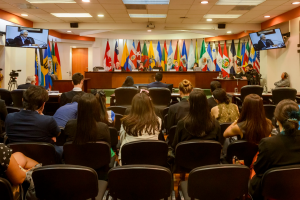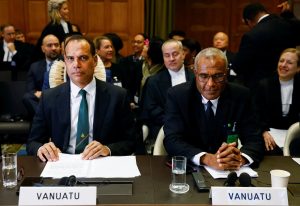By: Sarah Peck
Impunity Watch News Staff Writer
THE HAGUE, Netherlands – In January 2025, Belize, Cuba, and Ireland joined the growing list of countries that have applied with the International Court of Justice (ICJ) for permission to intervene in the high-profile case of South Africa v. Israel, concerning the Application of the Convention on the Prevention and Punishment of the Crime of Genocide in the Gaza Strip. South Africa initiated the case in December 2023, alleging that Israel violated its obligations under the Genocide Convention through actions taken during its military operations in Gaza. These operations followed the October 7, 2023, attacks by Hamas, which resulted in over 1,200 Israeli deaths and hundreds of hostages. In response, Israel launched military action in Gaza, leading to widespread destruction, tens of thousands of Palestinian casualties, and a humanitarian crisis.
 |
The ICJ issued provisional measures on January 26, 2024, when the Court ordered Israel to “take all measures within its power to prevent the commission of all acts within the scope of Article II of [The Genocide Convention]”, including killing members of the group, causing serious bodily or mental harm, deliberately inflicting “conditions of life calculated to bring about its physical destruction in whole or in part”, and imposing measure intended to prevent births within the group. Per the Court’s order, Israel is required to ensure its military comply with the order, take all measures within its power to prevent and punish direct and public incitement to commit genocide, enable humanitarian aid, preserve evidence, and report compliance with the Court. The case has drawn international scrutiny, prompting several nations to seek involvement through legal intervention.
The interventions by Belize, Cuba, and Ireland reflect a growing international interest in the case, as states invoke their rights under Article 63 of the ICJ Statute. This provision allows any state party to a convention under interpretation, in this case the Genocide Convention, to intervene if it has an interest in the legal questions at hand. While intervening states do not become parties to the dispute, their submissions can influence the Court’s interpretation of international law.
Each country’s decision to intervene highlights differing global perspectives on the conflict and the application of international legal norms. Belize and Cuba have historically aligned with pro-Palestinian positions in international forums, while Ireland has been vocal about human rights issues in the region, often criticizing Israel’s policies in the occupied Palestinian territories. Their involvement underscores the broader geopolitical implications of the case, as debates regarding military actions and the protection of civilian populations remain central to international relations.
As the proceedings continue, the ICJ’s eventual ruling could have far-reaching consequences for the interpretation of the Genocide Convention, state accountability for alleged violations, and the future of international humanitarian law. Beyond its legal implications, the case may influence diplomatic relations and shape global norms on accountability for mass atrocities. The Court’s decisions in the coming months will be closely watched by governments, legal experts, and human rights organizations worldwide.
For further information, please see:
ICJ – Application for Permission to Intervene and Declaration of Intervention of Cuba – 8 Jan. 2025



